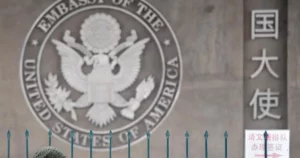
A Chinese court announced on Monday that a 78-year-old American citizen had been found guilty of espionage and sentenced to life in jail. However, little more information was made public.
Foreign nationals in China seldom receive such severe sentences, thus John Shing-wan Leung’s imprisonment is expected to further erode already frayed relations between Beijing and Washington.
Leung, who is also a permanent resident of Hong Kong, “was found guilty of espionage, sentenced to life imprisonment, and deprived of political rights for life,” according to a statement from the Intermediate People’s Court in Suzhou, in eastern China.
In April 2021, Suzhou officials “took compulsory measures according to the law” against Leung, it stated without mentioning when he had been brought into custody.
Leung’s residence at the time of his arrest was a mystery.
According to a representative of the American embassy in Beijing, they are aware of allegations that an American citizen was recently found guilty and given a sentence in Suzhou.
The spokeswoman asserted that the safety and security of American people abroad is the Department of State’s top priority. “We have no further comment due to privacy concerns.”
No other information regarding the charges was revealed in the court release, and sensitive cases frequently undergo closed-door trials in China.
At a routine press conference on Monday, Wang Wenbin, a spokesman for the foreign ministry, chose not to elaborate further on the situation.
At a news conference on Monday, Hong Kong’s security minister Chris Tang stated that the city’s officials were informed of Leung’s arrest in 2021.
Tang refused to go into more detail, only stating that “the Hong Kong police have carried out follow-up action in accordance with the notification.”
The imprisonment is likely to worsen already tense relations with Washington over topics including trade, human rights, and Taiwan.
An unofficial suspension in high-level communications between Washington and Beijing following the US shooting down of a rumored Chinese spy balloon in February has now been lifted.
In an apparent breakthrough this week, top Chinese diplomat Wang Yi and U.S. national security adviser Jake Sullivan met for eight hours in Vienna. Both parties described the discussion as “candid, substantive, and constructive.”
Washington released a statement on Friday criticizing the alleged conviction of a Chinese human rights activist for “inciting subversion of state power.”
According to rights organizations, Guo Feixiong, also known as Yang Maodong, was sentenced to eight years in prison. The sentence from China has not been formally confirmed.
In a statement, the U.S. State Department said that its diplomats had been forbidden from going to the southern Chinese trial.
“We urge the PRC to live up to its international commitments, give its citizens due process, respect their human rights and fundamental freedoms, including freedom of speech, and end the use of arbitrary detentions and exit bans,” stated Matthew Miller, a spokesperson for the U.S. State Department.
The country’s “judicial authorities act in accordance with the law, and their actions brook no interference,” a representative for the Chinese foreign ministry stated on Monday.
President of the United States Joe Biden is scheduled to travel to Hiroshima for a gathering of the heads of the G7 nations’ largest developed economies.
The G7 summit’s discussion of relations with China is anticipated to take up much of the agenda.
The arrest of Australian writer Yang Jun, who is Chinese by birth, in 2019 is one of several high-profile espionage instances in recent years.
Australia demanded this week that Cheng Lei, a convicted journalist, be reunited with her family after serving a year in prison for “supplying state secrets abroad.”
More than a year after being held while eating lunch with a Japanese diplomat in a Beijing restaurant, authorities charged a well-known Chinese journalist with spying in April, according to a media rights organization.
A revision to China’s anti-espionage law was also adopted in April. It expanded the definition of spying, prohibited the transmission of any material connected to what the government defines as national security, and broadened the law’s application.
The revised laws will take effect on July 1st.
Chinese law scholar Jeremy Daum said that “Chinese authorities have long had essentially free reign in addressing national security concerns.”
“The laws involved are sometimes amorphous and vague, leading to selective, or even arbitrary, enforcement,” he said, adding that because the term of “espionage” was already so broad, “it isn’t immediately clear what the impact of the expanded definition will be.”
